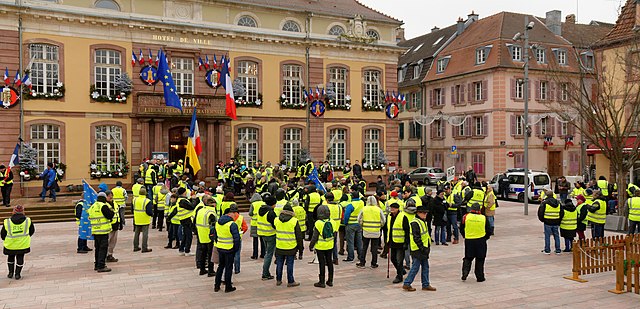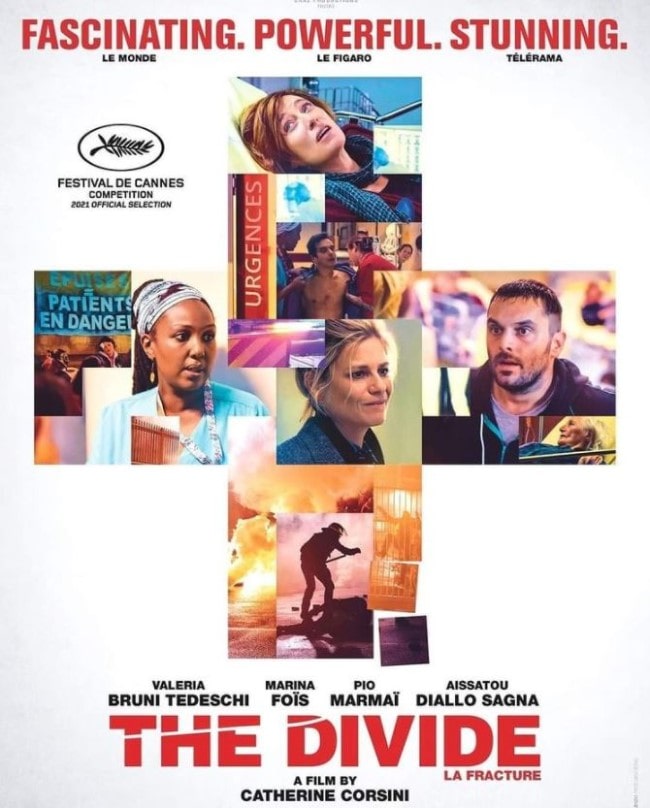Cinema: France Is Cracking Up In ‘La Fracture’
- SUBSCRIBE
- ALREADY SUBSCRIBED?
BECOME A BONJOUR PARIS MEMBER
Gain full access to our collection of over 5,000 articles and bring the City of Light into your life. Just 60 USD per year.
Find out why you should become a member here.
Sign in
Fill in your credentials below.
Is it too much to call La Fracture France’s best film comedy in years? Actually, I think in terms of humor that cuts to the bone, and made me laugh with that proverbial laugh that catches in your throat, it’s the best film comedy from any country in years. Its comedy isn’t artificial vaudeville or snarky attitude, as in so many American films, but a human comedy — a Dantesque Purgatorio, but with more laughs. The title has been translated into the lame The Divide, but it’s more properly called The Crack-Up, as it depicts France both falling apart and cracking up in laughter. Or simply transpose the French title, since the film is about not only a social and political fracture, but also a literal bone fracture. Two of them, in fact.

La Fracture, directed by Catherine Corsini (who directed the acclaimed Un Amour Impossible) is a wide-ranging social portrait, or if you prefer, an ensemble piece of the kind the French do so well. But it focuses on two characters: Raf (Valeria Bruni Tedeschi) is an artist who’s broken a bone in her right (drawing) arm. Yann (Pio Marmal) is a truck-driver who’s fractured a bone in his leg. Both of them can’t work as a result of their accidents, the director’s pointed commentary on how all of us may have our socio-economic situation demolished by chance calamities. Both wind up in a public hospital’s ER — the film is partially Corsini’s love letter to the French healthcare system. During much of the film they’re two opposing poles, but eventually come together, their relationship a center of gravity that anchors us in the midst of swirling activity, both funny and horrific.
View this post on Instagram
La Fracture takes place during the first eruption of the gilet jaune (yellow vest) revolt. It’s based on a true incident, when a group of gilet jaunes were pursued by marauding riot police to a hospital, where they found sanctuary. Yann, one of the yellow vests, never expected things to degenerate so violently — he’d just hoped President Macron would consent to meet them (sure, sure). If he doesn’t recover from his injury quickly enough to get back to his truck and make an important delivery he fears he’ll lose his job. Pio Marmal gives a fine, believable performance as a man of limited understanding, limited perhaps because of his straitened circumstances, oscillating between desperation and bravado. You want to shake him, but mostly you root for him and feel sorry for him.

Yellow vests protests (C) Thomas Bresson, (CC BY 4.0)
Raf, the artist and her same-sex partner Julie, a publisher of graphic novels, would seem to be the diametrical opposite of Yann, bourgeois-bohemians leading a plush Parisian life. Materially perhaps, but their household (including Julie’s teenaged son) is in the throes of an emotional fracture. Julie wants out, and Raf is left bereft. Valeria Bruni Tedeschi, a gifted director (most recently with 2018’s Les Estivants) as well as actress, gives a breathtaking performance as Raf. Words like “kooky”, “whacky”, “flaky” don’t do justice to the hilarious but terrifying wind-tunnel that is her emotional spectrum. The viewer is left speechless, though not laughless. Julie is played by Marina Fois, a stand-up comic most of the time, but the straight man (in stand-up terms) here, an exasperated lesbian Bud Abbot, whose barely restrained intensity matches Ms. Tedeschi.
View this post on Instagram
The rest of the ensemble cast is less spectacular than the three leads, but still brilliant. Aissatou Diallo Sagna is superb as Kim, the head nurse holding down the fort in the ER. She’s strong, humane, and socially conscious (she supports the yellow vests, not to mention the ER personnel, who are themselves on strike). She also has to deal with her own infant’s illness. We eventually have the impression that the director is laying it on a bit thick with her character, but I’ve known Parisian nurses remarkably similar to Kim’s portrayal. In addition, there are as many as a dozen supporting players who give outstanding hyper-realistic performances.
The director’s talent lies to a great extent in bringing out the actors’ talents, and choreographing all the characters. She shoots the ER goings-on in a semi-documentary style that’s assured though sometimes ham-fisted. La Fracture is similar in a number of ways to the 1970s film The Hospital, in its portrayal of chaos and political upheaval, and the sheer emotional rollercoaster of a big-city hospital. However that film came from a different time and mentality. It was doctor-oriented, and rather snide toward nurses (much like Robert Altman’s MASH from the same period). It was also condescending towards minorities, whereas Ms. Corsini creates a respectful mosaic of all the ethnicities making up the France of today.
View this post on Instagram
Tying up and resolving the narrative threads is a technical challenge which Ms. Corsini manages to pull off, with varying results (she doesn’t stint on the melodrama). The plus side of this is that on a human level she remains true to her complex vision, with certain destinies more or less comic or tragic (or melodramatic) than others. The final key of the film seemed a little contrived to me, but maybe that’s because after so much cinematic action set at a fevered pitch we want something akin to that final, definitive deep note at the end of “A Day in the Life.” With all due respect to the Beatles that may be easier done in music than in film.
As with other recent movies, we wonder about the pre-pandemic aspect of the story — is what’s meant to be hot off the presses ancient history for that reason? Perhaps. It will take a while before it no longer feels odd when the current texture of our lives — masks, distancing, regulations — is absent from a film. (Just like every conversation must include the obligatory take on “the situation”.) In any case, in recent weeks the gilet jaunes have reappeared on the scene, joining the weekly demonstrations in French cities against vaccination mandates. Pandemic or not, for the moment, la fracture is still with us.
Production: CHAZ Productions
Distribution: Le Pacte
Lead photo credit : The Divide film poster (C) aissatou.diallo.sagna, Instagram
More in Art, cinema, comedy, Director, film




